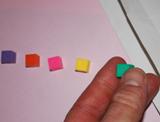Guess My Colour

You really can’t play enough probability games! How good are you at guessing? Does it involve any skill or it down to luck? If you get some extra information does your guess become more educated? Here are a couple of probability experiments with coloured cubes or counters to play.
Here is a short demonstration that should give you an idea what to do in the first experiment
Resources
This activity requires some coloured cubes or counters and something to draw them from. Students require 5 different colours and an envelope or bag each.
The following worksheet details two experiments to carry out ![]() Guess My Colour
Guess My Colour
Description
Here follows an outline of what the task is.
Experiment 1
- Put five different coloured cubes or counters into an envelope.
- You are going to take a cube from the envelope. Guess what colour you think it is going to be.
- Shake the envelope and, without looking, take a cube.
- Were you right? If so record a tick in the table below in 1st guess. If you were wrong put a cross.
- Without replacing the cube, repeat the experiment.
- Continue until you have taken out all five cubes.
Experiment 2
Here is a game for two players
- Player 1 secretly puts 5 coloured cubes or counters in an envelope without the other player seeing (e.g. 2 reds, 2 blues and 1 yellow).
- Player 2 is going to try and guess the contents of the bag.
- Player 2 draws one counter from the bag and records its colour. S/he replaces the counter.
- Repeat the experiment 9 more times.
- Player 2 guesses the contents of the envelope.
- Were they right? Check the contents of the envelope.
- Repeat the experiment swapping roles so that player 2 is guessing.
Related Activities
![]() Roll ‘em – A practical probability experiment with dice. Roll a dice then create lots of trials using Excel. This is the second in the series of three experimental probability experiments.
Roll ‘em – A practical probability experiment with dice. Roll a dice then create lots of trials using Excel. This is the second in the series of three experimental probability experiments.
![]() In a Spin – A practical probability experiment with an online virtual spinner. This is the third in the series of three experimental probability experiments.
In a Spin – A practical probability experiment with an online virtual spinner. This is the third in the series of three experimental probability experiments.

